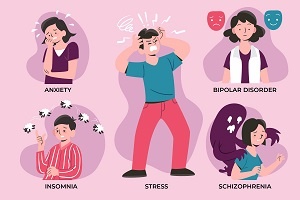
How to handle the problem of o
How to handle the problem of overthinking?
It is not uncommon for people to find themselves stuck in the cycle of overthinking. Sometimes, it can seem impossible to break out. Where does this thinking come from, anyway? How do you stop it when all you want to do is think more? This article will introduce some different techniques for handling your thoughts and breaking the cycle. For example, one technique is to question what your thoughts are based on or what they are trying to tell you. Another technique is to simply say “stop.” You may also enjoy reading about how therapists can help with this too!
The vicious cycle of distressing thoughts can make our life miserable
Sit comfortably and close your eyes. Try to observe your breathing – the inhaling and exhaling. If your attention is distracted by some other thoughts or disturbance, bring your attention back to breathing. See how long you can comfortably observe your breathing. In most cases, you will get perturbed by the inflow of random thoughts. You can’t sit comfortably and do this mental exercise. Some can’t even close their eyes for two minutes. Why? The reason is overthinking the flow of thoughts so forceful and continuous that the mind cannot relax for even two minutes. There is total identification of “I” with the thoughts. Such a situation is called “overthinking”. The mind will not be quiet.
When we think too much, instead of actually doing what we would like to do, we merely end up thinking. It is just a wastage of time and energy, and puts us in a vicious cycle of thinking and thinking over and over again. We can’t be happy for very long in such a situation. It is the overthinking mind that makes us feel anxious and worried about the future.
We also tend to ruminate on any past incident. For example, why did I make such a silly comment out of turn at that meeting? I could’ve avoided the embarrassment. Second, we worry about the future, assuming something bad is going to happen. For instance, I will not be able to make a speech due to my language problem. All of my senior executives will be gathered at this event, and they’ll surely notice, it will be embarrassing. This is how most of us, at some time or another, overthink. No one can escape from this mental characteristic. As most of us are completely identified with our minds, we don’t know when we overthink.
When we do, it’s the stream of harmful and distressing thoughts that fill our minds. We hardly overthink positive matters. We only ruminate or worry when we are trapped in unpleasant thoughts. No one is perfect. Each one of us has some deficiency or other imperfection in our personality, behavior, physical looks, and other attributes. Yet most of us give a great deal of attention to such real or imagined shortcomings or any problem we encounter in our routine life.
Psychologists have found that overthinking can be detrimental to our performance. Most of our pain comes from how we churn the negativity over and over again in our minds. The anxious brain is hypervigilant; always on the lookout for anything, it perceives to be dangerous or worrisome. When we are depressed and anxious, we overthink.
How to handle the problem of overthinking?
When we keep on overthinking all the time, it invariably leads to a mental disorder such as depression and anxiety. These disorders, in turn, reinforce overthinking. Under both conditions, we are deeply mired in distressing thoughts. Studies have shown that overthinking leads to serious emotional distress.
When people can’t escape from this condition, they often resort to unhealthy methods to cope with the problem. Many start abusing alcohol, some start or increase smoking, while others overeat. It becomes extremely difficult to enjoy sound sleep when our mind is disturbed. Studies confirm this, finding that rumination and worry lead to fewer hours of sleep and poorer sleep quality.

A recent UK study of more than 30,000 people showed that focusing on negative events (particularly including rumination and self-blame) can be the biggest predictor of some of today’s most common mental health problems. When a negative thought arises in the mind, it has the tendency to attract more associated thoughts.
When we think about dynamics that are harmful, fearful, or destructive, we are basically fuelling negative energy which lingers as memory in the brain cells/neurons – thus keeping the cycle going. Whenever the same set of thoughts is triggered, we get ourselves involved in the same loop of overthinking.
We, therefore, need to allow time to release the negative energy, and for that, we must fully face what arises in the mind. This is achieved by a simple but very effective exercise of “relaxed awareness.” We are required to watch the mind and observe the feelings in a non-judgmental, nonreactive, and, in a sense, detached way. Just sitting in a relaxed manner and acknowledging whatever arises in the mind is all it takes. After a few moments the negative energy, not given its usual fuel, will begin to dissipate, and we will see the pattern of negative thoughts start to break. As we stay in this space of relaxed awareness, the intensity and frequency of negative thought will diminish.
Practicing mindfulness meditation is indeed an effective technique for controlling overthinking. Sages have often noted that the mind is like a monkey. It jumps from one group of thoughts to another, restless and sometimes even uncontrollable. On such occasions, we must exercise greater awareness in our observation of whatever thoughts are arising in consciousness. Once we become aware that such thoughts are disturbing our minds, we are better able to identify the core causes of overthinking. When we do this, from that moment on, the intensity and frequency of distressing thoughts will start to decline.
Most of the time, the main problem is that we are not aware that we are in overthinking mode due to strong identification with our minds.
We fail to realize that it’s the mind that overthinks.
Sometimes we get trapped in the cycle of negative thinking. Negative and distressing thoughts tend to stick in our heads and they don’t easily leave. Even if we try to divert our attention or get ourselves busy with other things, the ‘stickiness of thoughts’ doesn’t allow those thoughts to loosen their grip over the mind.
We then fall into overthinking mode. We go on repeating the same set of thoughts. The frequency and intensity of those repeat thoughts will not automatically abate. We can however break this cycle through awareness. If we only become aware of those repeat thoughts, we can limit the recurrence of negative thoughts.

The best way to overcome overthinking is to learn the art of mindfulness. Our mind oscillates from pure awareness to complete mindlessness or absent-mindedness. We experience the highest state of awareness when we focus on the moments at hand. This state is known as mindfulness. When we are not mindful, we often become mindless, impulsive, and reactive. We become prone to miss valuable experiences because we are, in a sense, not awake during those times.
As a result, we are not able to exercise complete control over our inner world i.e. mind. Surprisingly, there is an extremely easy exercise through which we can learn and cultivate mindfulness. That mental exercise is meditation.
When we are mindful, conscious, and fully awake, we can effectively control the tendency of overthinking. We invariably overthink, when we are not in the present moment. Mindfulness-based meditation is currently one of the most powerful wellness trends in the world. It’s growing exponentially across many nations, including the USA and India. Since the benefits of meditation have been validated by scientific studies across the globe, very large numbers of people have started adopting this practice.
For more articles – Click here




